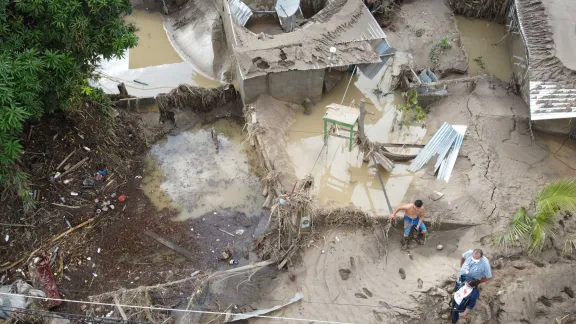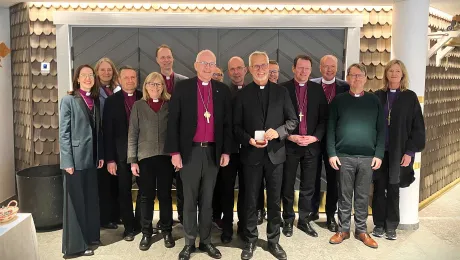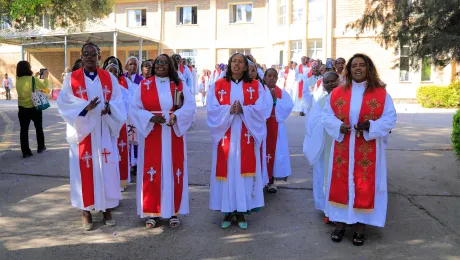
Extreme weather events: LWF representative Carlos Rivera (with white face mask) visiting Chamelecón, Honduras, where many homes were washed away in unexpected flooding from the hurricanes Eta and Iota in 2020. Photo: LWF/Sean Hawkey
Climate change is real, lives and livelihoods are already threatened
(LWI) - The Lutheran World Federation (LWF) welcomes the latest scientific report of the Intergovernmental Panel on Climate Change (IPCC) as “yet another confirmation that the climate crisis facing the world is the most crucial existential challenge of our time."
IPCC, the United Nations body that assesses the science related to climate change issued the Climate Change 2021: the Physical Science Basis report on 9 August. It is the first instalment of the forthcoming comprehensive Sixth Assessment Report. In the report, the UN body observes that the Earth’s climate is changing in every region and across the whole climate system. Some of the changes such as rising sea levels are irreversible over hundreds to thousands of years.
“The report confirms what millions of people have been telling us already for decades – that climate change is real and it is already threatening lives and livelihoods, especially of those who are already vulnerable,” says Isaiah Toroitich, LWF head of Global Advocacy.
We welcome this report as a strong scientific basis for climate action. We need urgent and ambitious climate action now—this and the future generations depend on it.
“We welcome this report as a strong scientific basis for climate action. It is clear that governments are not taking the problem seriously enough, and not even living up to the commitments in the Paris Agreements. We need urgent and ambitious climate action now—this and the future generation depend on it,” he adds.
The report projects a 1.5°C of global warming within the next two decades, with increasing heat waves, longer warm seasons and shorter cold seasons. As the report raises the alarm on possible catastrophic and extreme climate impacts, it also affirms that if action is taken right now, there is hope of avoiding the worst-case scenarios.
“Every single action to reduce greenhouse gas emissions and to build resilience - be it from governments, businesses, and individuals – counts. Collectively, we need to bring emissions down,” says Toroitich.
LWF’s climate justice advocacy at the global level includes active participation in the UN climate negotiations, with preparations underway for the COP26 gathering in Glasgow later this year. In addition, the LWF supports its member churches to mitigate the effects of climate change on the most vulnerable people and building their resilience to adapt. Through World Service, LWF assists communities that have been affected by war, conflict and displacement, the root causes of which are often related to climate change induced worsening of conditions such as scarcity of water, and arable and grazing land.
“The LWF will redouble its efforts to support people and communities affected by humanitarian crises resulting from climate change even as we keep calling for climate justice, intergenerational justice and care for creation,” Toroitich adds.
The IPCC publishes comprehensive scientific assessment reports on climate change every six to seven years; the previous one (the Fifth Assessment Report) was completed in 2014, and was a key reference in the negotiation of the 2015 Paris Agreement.


